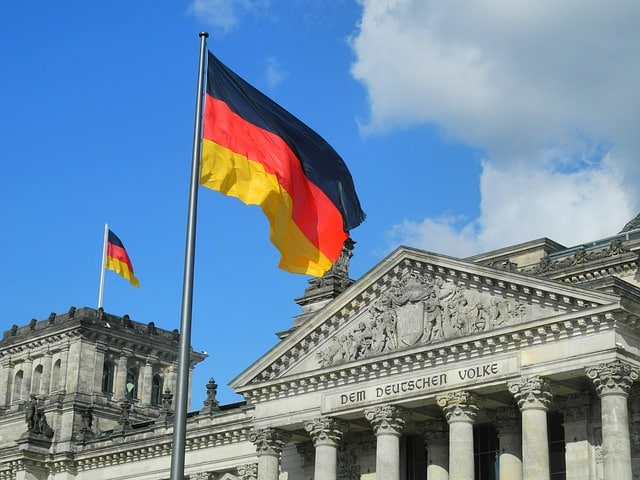Germany’s Groundbreaking Blockchain-Based Securities Bill Paves the Way for Digital Financial Markets
In a landmark move that could reshape the future of financial markets, Germany’s Federal Ministry of Finance has announced that the German cabinet has passed a draft legislation on electronic securities. This forward-thinking regulation aims to integrate blockchain-based securities into Germany’s financial ecosystem, further solidifying the country’s commitment to innovation in blockchain technology.
The new legislation, first proposed in August this year, will make paper stock certificates a thing of the past, paving the way for digital securities and tokens to be recorded on an electronic ledger. This transition marks a significant step toward greater efficiency, transparency, and security in financial transactions, particularly in securities trading.
The Vision Behind Blockchain-Based Electronic Securities
The core purpose of this initiative is to secure investors’ interests while simultaneously enhancing the functionality, integrity, and transparency of Germany’s financial markets. By allowing the use of blockchain to register and store securities, the country aims to improve the efficiency and security of financial transactions, providing clear benefits for both investors and financial institutions.
Blockchain technology is inherently secure, offering digital ledgers where transactions are encrypted and publicly verifiable. This allows for an unprecedented level of transparency and reduces the potential for fraud or manipulation. The implementation of electronic securities will ensure that Germany’s financial markets maintain the highest levels of trust and security.
A Digital Transformation: From Paper to Blockchain
The new law’s primary goal is to replace traditional paper-based securities with digital versions. Under the legislation, companies will no longer need to issue paper certificates. Instead, blockchain-based records will be maintained in a central securities depository or crypto securities registers run by private-sector banks. This approach will allow digital custody of assets and enable more efficient and secure transactions between parties.
According to Justice Minister Christine Lambrecht, the law will provide legal clarity for companies and investors in the digital securities space. It will also create an environment where new technologies can thrive, further establishing Germany as a leader in blockchain innovation. By regulating blockchain-based securities, the government ensures that these new financial products are legally recognized and secure.
Blockchain Technology: A Transparent and Secure Solution
The blockchain ledger works by recording transaction information in an encrypted form that is accessible to all parties involved. This makes it extremely difficult to alter, providing a high degree of immunity to fraud and manipulation. Since the data is decentralized and publicly available, it ensures that the integrity of each transaction can be easily verified by anyone with access to the blockchain.
The law aims to leverage these characteristics of blockchain to enhance the efficiency of the stock market, moving away from outdated systems that rely on paper certificates. By shifting to a blockchain-based model, Germany’s financial markets will be better positioned for the digital age, reducing the costs and complexities associated with traditional securities registration and custody.
Deutsche Börse and SIX Collaboration: A Step Toward Blockchain Integration
As part of this groundbreaking shift, Deutsche Börse, Germany’s largest stock exchange, has partnered with SIX, the Swiss stock exchange, to initiate a blockchain-based securities issuance project. This collaboration signals a strong commitment from traditional financial institutions to explore blockchain technology and its potential to revolutionize market infrastructure.
According to reports, the new law will introduce a cutting-edge framework for the issuance and trading of blockchain-based securities. The framework will incorporate necessary adjustments to Germany’s Banking Act (KWG), allowing for the proper oversight and regulation of digital securities. This will give investors and institutions the legal certainty and protection they need to confidently engage in blockchain-based securities trading.
Regulatory Oversight by BaFin
As part of the new legislative measures, Germany’s Federal Financial Supervisory Authority (BaFin) will oversee the issuance of electronic securities and maintain the digital ledgers. BaFin will ensure that the legal standards are met and that the integrity of the market is preserved. This regulatory oversight is crucial in ensuring that the transition to blockchain-based securities remains secure and compliant with the country’s financial laws.
Germany’s Commitment to Blockchain Innovation
This new law is part of Germany’s larger strategy to promote blockchain technology. Germany has already made significant strides in adopting blockchain solutions for various industries, and the introduction of blockchain-based securities is the next logical step in this journey. By enabling companies to issue digital securities, Germany is positioning itself as a key player in the global blockchain and crypto markets.
The passing of the electronic securities bill is a clear signal that Germany is taking steps to establish itself as a leading blockchain hub in Europe and beyond. The integration of blockchain into Germany’s financial markets will likely pave the way for other countries to follow suit, promoting a global shift toward more transparent, secure, and efficient financial systems.
Conclusion: A New Era for Financial Markets in Germany
Germany’s decision to adopt blockchain-based electronic securities is a groundbreaking move that will undoubtedly impact the future of financial markets. The legal clarity provided by the new law will encourage greater adoption of blockchain technology, enhancing transparency and security in Germany’s stock markets. With major players like Deutsche Börse and SIX backing the initiative, the shift towards digital securities is gaining momentum, and Germany is poised to lead the way in the digital transformation of financial markets.
By embracing blockchain technology, Germany is taking a bold step toward modernizing financial markets, fostering innovation, and establishing itself as a global leader in blockchain and cryptocurrency regulation.
To learn more about the innovative startups shaping the future of the crypto industry, explore our article on latest news, where we delve into the most promising ventures and their potential to disrupt traditional industries.
Disclaimer: The information provided is not trading advice, Bitcoinworld.co.in holds no liability for any investments made based on the information provided on this page. We strongly recommend independent research and/or consultation with a qualified professional before making any investment decisions.




